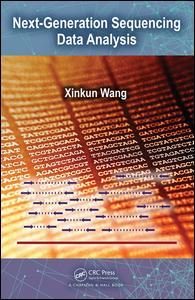Next-Generation Sequencing Data Analysis
Auteur : Wang Xinkun

A Practical Guide to the Highly Dynamic Area of Massively Parallel Sequencing
The development of genome and transcriptome sequencing technologies has led to a paradigm shift in life science research and disease diagnosis and prevention. Scientists are now able to see how human diseases and phenotypic changes are connected to DNA mutation, polymorphism, genome structure, and epigenomic abnormality. Next-Generation Sequencing Data Analysis shows how next-generation sequencing (NGS) technologies are applied to transform nearly all aspects of biological research.
The book walks readers through the multiple stages of NGS data generation and analysis in an easy-to-follow fashion. It covers every step in each stage, from the planning stage of experimental design, sample processing, sequencing strategy formulation, the early stage of base calling, reads quality check and data preprocessing to the intermediate stage of mapping reads to a reference genome and normalization to more advanced stages specific to each application. All major applications of NGS are covered, including:
- RNA-seq: mRNA-seq and small RNA-seq
- Genotyping and variant discovery through genome re-sequencing
- De novo genome assembly
- ChIP-seq to study DNA?protein interaction
- Methylated DNA sequencing on epigenetic regulation
- Metagenome analysis through community genome shotgun sequencing
Before detailing the analytic steps for each of these applications, the book presents the ins and outs of the most widely used NGS platforms, with side-by-side comparisons of key technical aspects. This helps practitioners decide which platform to use for a particular project. The book also offers a perspective on the development of DNA sequencing technologies, from Sanger to future-generation sequencing technologies.
The book discusses concepts and principles that underlie each analytic step, along with software tools for implementation. It highlights key features of the tools while omitting tedious details to provide an easy-to-follow guide for practitioners in life sciences, bioinformatics, and biostatistics. In addition, references to detailed descriptions of the tools are given for further reading if needed. The accompanying website for the book provides step-by-step, real-world examples of how to apply the tools covered in the text to research projects. All the tools are freely available to academic users.
Introduction to Cellular and Molecular Biology:The Cellular System and the Code of Life. DNA Sequence: The Genome Base. RNA: The Transcribed Sequence. Introduction to Next-Generation Sequencing (NGS) and NGS Data Analysis: NGS Technologies: Ins and Outs. Early-Stage NGS Data Analysis: Common Steps. Computing Needs for NGS Data Management and Analysis. Application-Specific NGS Data Analysis: Transcriptomics by RNA-Seq. Small RNA Sequencing. Genotyping and Genomic Variation Discovery by Whole Genome Resequencing. De novo Genome Assembly from NGS Reads. Mapping Protein–DNA Interactions with ChIP-Seq. Epigenomics and DNA Methylation Analysis by NGS. Metagenome Analysis by NGS. The Changing Landscape of NGS Technologies and Data Analysis:What Is Next for NGS? Appendices. References. Index.
Dr. Xinkun "Sequen" Wang is the director of the NUSeq Core Facility and research associate professor in the Department of Biochemistry and Molecular Genetics at Northwestern University. He was previously an associate research professor of neurogenomics in the Higuchi Biosciences Center and Department of Pharmacology and Toxicology at the University of Kansas, where he was also the director of the Genomics Facility and Genome Sequencing Core. Dr. Wang’s research focuses on unraveling genomic changes that underlie neurodegeneration in brain aging and neurodegenerative diseases, such as Alzheimer’s disease.
Date de parution : 02-2016
15.6x23.4 cm
Disponible chez l'éditeur (délai d'approvisionnement : 15 jours).
Prix indicatif 105,47 €
Ajouter au panierThèmes de Next-Generation Sequencing Data Analysis :
Mots-clés :
Reference Genome; NGS Data; RNA Seq Data; Third generation sequencing; Paired End Reads; variant discovery; DNA Methylation; Bioinformatics; BAM File; Data analysis; NGS Data Analysis; Next generation sequencing; Small RNAs; Methylated DNA sequencing; DNA Template; Genome sequencing; DNA Methylation Sequencing; Metagenome analysis; NGS Platform; Genetics; Read Length; Next-Generation Sequencing platforms; Read Pairs; RNA-seq; Soap; Massively Parallel Sequencing; DNA Polymerase; Single cell sequencing; ChIP Seq Data; Transcr



